Announcement
#1 2019-01-07 02:15:12
- Svetonio
- Member

- Registered: 2012-03-11
- Posts: 7525
What's Prog?
There's a kind of taboo at the music forums these days about the question that has been asked so many times by the newbies, especially in this decade - what's prog? Indeed, it's like a moratorium on this subject because it stirred up too fierly arguing at discussion boards and among the forums' 'influential members' & moderators. As this forum is safe from that dangerous situation, and as I am an old fart who started in 1975 to buy the records seriously, to read music-zines and to attend concerts, I will try to explain to the newbies - at least to those that come to read this forum - how "Prog" was born, what it was and what's "Prog" now. But, we must start from the beginning, because most of the newbies don't know what 'Rock' is, so how then to explain to them what Progressive rock was / is? Thus, firstly - what is Rock?
Offline
#2 2019-01-07 03:14:31
- Svetonio
- Member

- Registered: 2012-03-11
- Posts: 7525
Re: What's Prog?
In the years before 'Rock' was born, there were only genres of Pop(ular music) like ye-ye, rockabilly, rock'n'roll, folk, blues, R&B, soul, jazz, Schlager music and so on. 'Rock' as a genre was developed by London-based Mod bands that were playing Tamla Motown's R&B standards in a more aggressive way. And in that way, they invented the most important thing for Rock music - *riff*. No riffs, no Rock; i.e. when Pete Townshend starts the riff of I Can't Explain, that's Rock. When Keith Richards starts the riff of (I Can't Get No) Satisfaction, that's Rock.
Also, 'Rock' song lyrically breaks with the Popular music tradition of sweet verses. 'Rock' verses started being "serious", socially oriented, bitter and "politically incorrect". NME journalist Nick Logan was right when he wrote in The Illustrated New Musical Express Encyclopedia of Rock (1976) that The Who's My Generation was that song which drew the line between pop and Rock.
to be continued..
Offline
#3 2019-01-07 08:27:02
- Svetonio
- Member

- Registered: 2012-03-11
- Posts: 7525
Re: What's Prog?
Everyone at the music forums will gladly explain to a newbie the importance of Psychedelia movement for discovery of a genre called Progressive rock, and it's okey, as we know that Progressive rock was invented in "psychedelic" milieu of Swinging London; to the question of "what is Psychedelia and how it occured?", many will immediately shout about LSD and San Francisco 1966 i.e. Summer of Love; or they're just gonna to praise some albums from the West Coast's hippie scene of electrified folk music that is wrongly called "rock". Some people say that Psychedelia was actually a zeitgeist, which is true. Yes, it was a zeitgeist, and it is true that acid was legal and fresh, but from which event that zeitgeist exactly came about? i.e. who released the ghost from the bottle? Who is to blame for such an important movement not only in music, but also in visual arts, literature, films and fashion? Well, it was in 1965 on a LSD - fuelled party in Zsa Zsa Gabor's mansion in Los Angeles; on that party, The Beatles were introduced to Ravi Shankar's sitar music by The Byrds frontman Roger McGuinn. That impact was so strong that inspired George Harrison to take sitar lessons from Shankar; it took The Beatles to India to meet Indian guru Maharishi Manesh Yogi and had that crucial influence on The Beatles' albums Rubber Soul, Revolver and Sgt Pepper's Lonely Hearts Club Band.
The rest of the story is well-known history of Psychedelic music as a meta-genre and Psychedelic rock as its genre because The Beatles were "more popular than Jesus" at the time.
Norwegian Wood (This Bird Has Flown) by The Beatles (from Rubber Soul, 1965)
Tomorrow Never Knows by The Beatles (from Revolver, 1966)
Rain by The Beatles (7'' single, 1966)
Back To Earth by Ravi Shankar (from Chappaqua, 1966)
to be continued..
Offline
#4 2019-01-08 09:27:00
- Svetonio
- Member

- Registered: 2012-03-11
- Posts: 7525
Re: What's Prog?

And alike to The Who that with their aggressivity, all that noise and Townshend's riffs but also with lyrically relieved 'Rock' music from the then Popular music's binding rule that "the-music-for-masses-have-to-be-nothing-but-pleasant" and directed it towards both lifelike, social topics and "too weird" fantasies, and alike to The Beatles who were acting like a collective creative mind on LSD while they expanded that expressive palette for pop-rock music, Jimi Hendrix was also responsible for creating the conditions for the birth of Progressive rock because he gave an amazing musical metamorphosis to lead guitar; due to Jimi, the meaning of electric guitar solo has changed once for forever, and hence allowed every skillful guitarist to sharp his own musical vocabulary in his solo part.
Hendrix appeared at the scene at the right moment, i.e. at the time when Psychedelic rock movement that took the place in Swinging London's underground clubs and led by Syd Barrett's Pink Floyd, experienced the upper point of its creativity and when the path from there must have led towards a more complex and more demanding sound. As an extremely gifted musician, Jimi finally broke the dogma about the split on the rhythm and lead guitar and showed to everyone that a trio formation of the guitar-bass-drums didn't say everything with the 60s acts like Cream and the aforementioned The Who. As a guitar genius, Hendrix used feedback as a natural extension of the instrument and put his astonishing solo lines on terrific accordion basis. Well, the importance of Jimi's electric guitar revolution for the birth of Progressive rock is not even needed to be explained in particular - just have in mind that for "soaring" guitar solo as one of Prog's landmarks, we must thank Jimi.
The Wind Cries Mary live in Stockholm, 1967
Wild Thing live at Monterey Pop Festival, 1967
to be continued..
Offline
#5 2019-01-09 11:12:00
- Svetonio
- Member

- Registered: 2012-03-11
- Posts: 7525
Re: What's Prog?
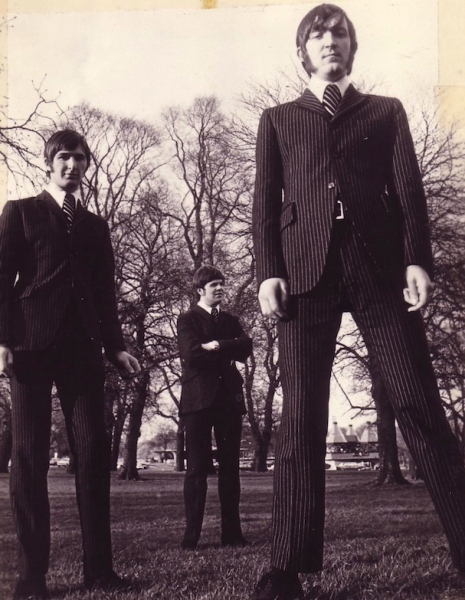
"1-2-3", 1966
Thus, as far as we know now what had to happen on London's scene prior to the birth of Progressive music, a quite logical question is posed - how did it all begin? Actually, our beloved genre came out from three directions; one direction was created by an artist who came to London from Scotland. His name is Billy Ritchie and he led a band called "1-2-3" (later renamed to "Clouds"). The way that Ritchie played his extended solos on Hammond organ, his imitations of the sounds of church organ that were merged with their vocal harmonies on the basis of a melodic pop song, it was something completely new and never heard before. In the then music-press, the band were described as "an unique group who have created an entirely new sound in pop group music". A crowd of Swinging London's underground scene that was pretty receptive to new & "weird" things due to then "psychedelic" zeitgeist, enthusiastically called Ritchie's music "progressive". Hence Ritchie's style was immediately adopted by young and talented keyboard player Keith Emerson and the style develops further with Emerson's band The Nice; it later became known as "Symphonic rock" as a genre with a focus on the keys, a lot of virtuosity and with the use of Classical Music sounds , without heavy riffs and without aggressivity of above mentioned 'Rock' genre.
Sadly, 1-2-3 weren't lucky enough to record an album at the right time. However, Billy Ritchie's importance & influence is undeniable.
America by 1-2-3, live in Marquee, London 1967
Rondo by The Nice, live at Swidish radio, 1967
Ars Longa Vita Brevis by The Nice, live at The Fillmore East, 1969
America by The Nice, live appearance at Swiss tv show "HitsAGoGo", 1968
Diary Of An Empty Day by The Nice (from Nice, 1969)
Heritage by Clouds (from 7-inch single, 1969)
Released on Deram as a single in 1967, Nights In the White Satin is the first ever ballad-like Symphonic rock (i.e. "Prog Rock") song that was pressed on vinyl and being pretty influential as well.
Moody Blues Nights In the White Satin (from 7-inch single, 1967)
to be continued...
Offline
#6 2019-01-09 23:31:44
- Svetonio
- Member

- Registered: 2012-03-11
- Posts: 7525
Re: What's Prog?

Stylistically quite opposite to '1-2-3' and The Nice which songs were tagged by the audience as "Progressive music" - later called "Symphonic rock" - due to lack of riffs and aggressivity of Rock as their style was developed on a pop song basis with charming addition of the Classical Music sounds and a virtuosity on the keyboards, Progressive rock as a genre came from 'Rock' that has a long tail in black R&B roots. The first representative of that music direction was a band called Family that went to London from Leicester, a city in the East Midlands of England. Family merged their R&B roots with odd time signatures, folk music, hint of jazz and several unusual instruments for a Rock band at the time, including a cello, violin, mellotron and two saxophones; also, they were the first band where lead vocal - by frontmen Roger Chapman - was treated as an instrument. Therefore, Family promptly earned the "progressive" tag by the audience and the journalists; Progressive rock was born.
As a group of great instrumentalists, Family quickly became one of the best live attractions on the "progressive" underground scene. In december 1967 and early 1968, they recorded the first album of Progressive rock; a masterpiece titled Music in a Doll's House was released in july 1968. I have posted something here about the album, due to its 50 year anniversary.
Family captured live by French TV performing their song Me My Friend at the Speakeasy, London, 1967:
Family Home Town (7-inch single, 1968)
Family Voyage (from Music in a Doll's House, 1968)
Family The Weavers Answer (from Family Entertainment, 1969)
Family Drowned In Wine, live television performance from 1970.
to be continued..
Offline
#7 2019-01-10 10:45:32
- Svetonio
- Member

- Registered: 2012-03-11
- Posts: 7525
Re: What's Prog?
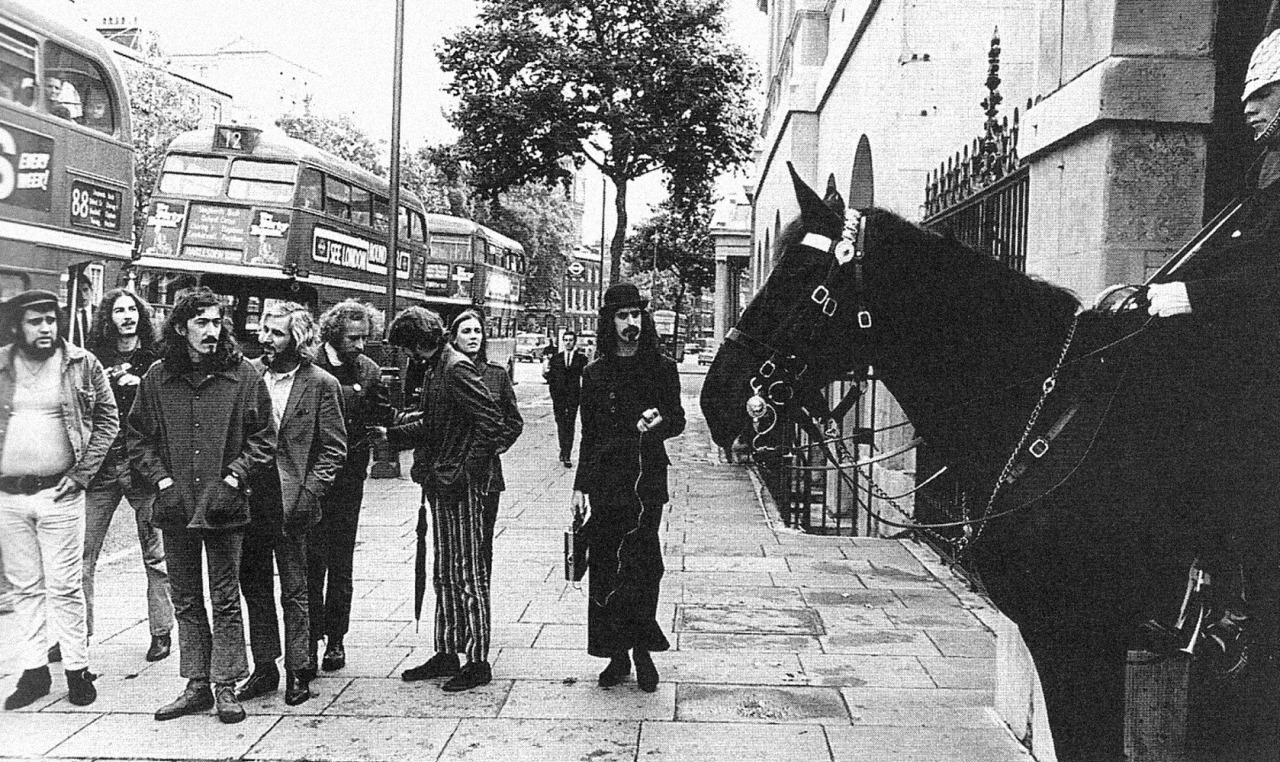
The Mothers of Invention in London, 1968
In 1966, American avant-garde musician Frank Zappa and his band The Mothers of Invention released a double album of experimental rock titled Freak Out! which gained some success in England. Hence they were playing in England in 1968 where they heavily influenced English Underground band Soft Machine and that influence has creatively pushed Soft Machine to invent their own "progressive", surrealistic, humorous, dreamy and pastoral mixture of psychedelia, jazz and underground rock that decades later will be labeled as "Canterbury sound" as a distinct genre. The Mothers of Invention are also to blame for the music of English and European experimental rock bands like Henry Cow, Magma, Buldožer et cetera.
The Return Of The Son Of Monster Magnet (Unfinished Ballet In Two Tableaus) by The Mothers of Invention (from Freak Out!, 1966)
The Mothers of Invention live in London, 1968
Volume Two by Soft Machine (1969)
Soft Machine live, 25 August 1968 Ce Soir On Danse
English jazz-rock guitarist Allan Holdsworth's first band 'Igginbottom is often neglected in perceiving the beginnings of the Jazz-Rock genre. However, with their only album (Igginbottom's Wrench, 1969) 'Igginbottom have defined the genre.
Golden Lakes by 'Igginbottom (1969)
to be continued...
Offline
#8 2019-01-11 08:23:37
- Svetonio
- Member

- Registered: 2012-03-11
- Posts: 7525
Re: What's Prog?
A definition of Progressive rock
Progressive rock is a musical genre in which, beside its 'Rock' roots, the sounds of jazz, Classical music and folk can be heard very often. The genre was created at Swinging London's underground scene and remained largely a British and European musical movement. Back in 1967, Progressive rock performers felt impoverished by the dominance of the then-omnipresent American blues-rock and a radio-friendly pop music, so they merged 'Rock' with complexity of jazz as well as with sophistication of Classical music. Both the performers and the audience of Progressive rock originated from the white middle class; also, it was / is mostly male audience.
The main features of the Progressive rock are:
odd time signatures
use of non-standard instruments for classic 'Rock' of the Sixties
unusual melodies and harmony
unusual singing techniques
insisting on virtuosity
insisting on structured based composition
lengthy songs
conceptual albums
insisting on fantasy-style illustrations on the album-jackets
*When Genesis' Trespass was released in Italy in 1970, it was a huge success and rock sinfonico the term was coined. It didn't take long for its English version - "symphonic rock" the term (abbreviation "sympho-rock") - to became popular and frequently used in Europe back then. But although it was almost a synonym for Progressive rock, it wasn't the same thing. Symphonic rock is indeed similar to Progressive rock regarding odd time signatures, unusual melodies, lengthy songs, virtuosity et cetera, but it's loosely based on Pop and hence it's without a hint of blues and jazz that is so significant for Progressive rock. Symphonic rock does feature more influences of Classical music and epic orchestration that is merged with a pseudo-rock beat of Pop which is without heavy riffs & aggression of ‘Rock’. This subgenre is characterized by great use of keyboards and guitar interplay. The atmosphere is even more lush, more dreamy and with more acoustic & slide guitars that are often used in lengthy ballad-like songs that are so typical for this subgenre. On some albums though, both directions are equally represented, so on e.g. In the Court of the Crimson King the album, 21st Century Schizoid Man is Progressive rock song, while the title track is ballad-like "Symphonic rock" song.
**Jazz-Rock is a "progressive" music genre originated in England in the late 60s that insists on more jazz variety while keeping a degree of rock music beats. Jazz-Rock, as a genre that belong to Progressive music movement, should not be mess with Jazz Fusion, since latter is when a jazz band play a Jazz music inspired by Rock and (or) some other non-jazz genre(s) like e.g. Funk, and despite its name, Jazz Fusion is not a fully conjoin of two genres into one like e.g. the music of Soft Machine; Jazz Fusion was originated primarily as a genre of Jazz with non-jazz influence, not as a genre of Progressive music.
*** 'Progressive music' as a term means both a meta-genre that encompass "progressive" genres - i.e. Progressive rock, Symphonic rock and Jazz-Rock - and very small pigeonhole for just a few bands & solo artists, for instance Mike Oldfield's Tubular Bells could be entirely tagged only as progressive music as a sub-sub genre as well.
Offline
#9 2019-01-11 09:48:15
- Svetonio
- Member

- Registered: 2012-03-11
- Posts: 7525
Re: What's Prog?
How did the Progressive rock, having conquered the underground scene, being elevated to the then mainstream? It happened when Family and King Crimson both successfully dealt - although King Crimson didn't release their debut album yet - a place in the programme of The Rolling Stones' one-day free festival called "The Stones in the Park", in London's Hyde Park in June 1969. Family were great as always, but that day a thunderous version of 21st Century Schizoid Man and the grand sound of The Court of The Crimson King won the hearts of 500,000 spectators.
A few months later, in October 1969, King Crimson released their debut album, In The Court of the Crimson King. The album was critically acclaimed unanimously and hence confirmed King Crimson's status as the most fashionable band at that time in England.
King Crimson 21st Century Schizoid Man, live at Hyde Park, London 1969
King Crimson The Court of the Crimson King (from In The Court of the Crimson King, 1969)
King Crimson In The Wake Of Poseidon (from In The Wake Of Poseidon, 1970)
King Crimson The Battle Of Glass Tears (Dawn Song, Last Skirmish, Prince Rupert's Lament) (from Lizard, 1970)
King Crimson Sailors Tale (from Islands, 1971)
to be continued...
Offline
#10 2019-01-12 11:36:22
- Svetonio
- Member

- Registered: 2012-03-11
- Posts: 7525
Re: What's Prog?
How long the heyday of Progressive music lasted? Once it has begun out of the Swinging '60s Underground music scene and went really hype, the heydays of Prog lasted almost all the Seventies; Prog bands were supported by the army of fans as well as by the record companies and "official" rock critics that unanimously praised the genre until the late autumn 1976 when punk-rock hysteria occurred in England and when the rock journalists turned their radars to the punk movement and praised it as a "new big thing" although it was just another "back to basics" as well as an antithesis of everything what Prog achieved musically in the previous years.
However, within its three above mentioned main-directions - i.e. progressive rock, symphonic rock and jazz-rock + "Prog-related" genres like Experimental rock (also called "avant-rock"), experimental & "motorik" German psychedelic rock called 'Krautrock' & electronic 'Kosmische musik', French pseudo-avantgarde called 'Zeuhl', "proggy" Psychedelic rock by David Gilmour's Pink Floyd, Space Rock a la Hawkwind, Spirogyra & Jethro Tull's "progressive" take on folk music - the genre achieved a lot of great music in just one decade; indeed, Progressive music spawned some astonishing and undeniable masterpieces of the 20th century music.
A must have list of - in my humble opinion - the greatest albums released in the "golden era" of Progressive rock, Symphonic rock and Jazz-Rock, and related "proggy" genres as well:
The Mothers Of Invention Freak Out! (experimental rock, released in June 1966)
Family Music in A Doll's House (progressive rock, released in July 1969)
East of Eden Mercator Projected (progressive rock, released in July 1969)
Clouds Above Some People's Heads (symphonic rock, released in March 1969)
'Igginbottom 'Igginbottom's Wrench (jazz-rock, released in March, 1969)
Soft Machine Volume Two (progressive rock /"Canterbury scene"/, released in September 1969)
The Nice Nice (symphonic rock / jazz-rock, released in September 1969)
Frank Zappa Hot Rats (experimental rock, released in October 1969)
King Crimson In the Court of the Crimson King (progresive rock / symphonic rock, released in October 1969)
Pink Floyd Ummagumma (psychedelic rock, released in November 1969)
Web I Spider (progressive rock, released in January 1970)
Larry Coryell Spaces (jazz-rock, released in January 1970)
Quill s/t (progressive rock, released in January 1970)
Family A Song for Me (progressive rock, released in January 1970)
Marsupilami s/t (progressive rock, released in January 1970)
Forest Full Circle (progressive folk-rock, released in January 1970)
Raw Material Time and Illusion (progressive rock, released in March 1970)
Soft Machine Third (jazz-rock /"Canterbury scene"/, released in June 1970)
Gracious Gracious! (symphonic rock, released in June 1970)
Caravan If I Could Do It All Over Again, I'd Do It All Over You (progressive rock / "Canterbury scene", released in September 1970)
Santana Abraxas (jazz-rock, released in September 1970)
Genesis Trespass (symphonic rock, released in October 1970)
The Incredible String Band U (progressive folk-rock, released in October 1970)
Emerson, Lake & Palmer s/t (symphonic rock, released in November 1970)
East of Eden Snafu (progressive rock, released in November 1970)
Van Der Graaf Generator H to He, Who Am the Only One (progressive rock, released in December 1970)
King Crimson Lizard (progressive rock / symphonic rock, released in December 1970)
Nucleus We'll Talk About It Later (jazz-rock, released in December 1970)
Oregon Our First Record (progressive music, recorded in 1970; offically released in 1980)
Egg The Polite Force (symphonic rock, released in February 1971)
Yes The Yes Album (symphonic rock, released in February 1971)
Barclay James Harvest Once Again (art rock, released in February 1971)
Spirogyra St. Radigunds (progressive folk-rock, released in March 1971)
Comus First Utterance (progressive folk-rock, released in March 1971)
Jethro Tull Aqualung (progressive rock, released in March 1971)
Spring s/t (progressive rock, released in April 1971)
Broselmaschine s/t (progressive folk-rock, released in April 1971)
The Nice Elegy (symphonic rock / jazz-rock, released in April 1971)
Caravan In the Land of Grey and Pink (jazz-rock / "Canterbury scene", released in April 1971)
Strawbs From the Witchwood (progressive folk-rock, released in July 1971)
Van Der Graaf Generator Pawn Hearts (progressive rock, released in October 1971)
Gong Camembert Electrique (progressive rock / "Canterbury scene", released in October 1971)
Focus Moving Waves (progressive rock, released in October 1971)
Pink Floyd Meddle (psychedelic rock, released in October 1971)
Yes Fragile (symphonic rock, released in November 1971)
Genesis Nursery Cryme (symphonic rock, released in November 1971)
Elton John Madman Across the Water (art rock, released in November 1971)
Il Balletto di Bronzo Ys (symphonic rock, released in February 1972)
Time s/t (progressive rock, released in February 1972)
Todd Rundgren Something/Anything? (art rock, released in February 1972)
Jethro Tull A Passion Play (symphonic rock, released in March 1972)
Roxy Music s/t (art rock, released in June 1972)
Emerson, Lake & Palmer Trilogy (symphonic rock, released in July 1972)
Yes Close to the Egde (symphonic rock, released in September 1972)
Genesis Foxtrot (symphonic rock, released in October 1972)
Santana Caravanserai (jazz-rock, released in October 1972)
Can Ege Bamyasi (krautrock, released in November 1972)
Frank Zappa & The Mothers The Grand Wazoo (jazz-rock, released in November 1972)
Premiata Forneria Marconi Per un amico (symphonic rock, releeased in November 1972)
Gentle Giant Octopus (progressive rock, released in December 1972)
Jethro Tull Thick as a Brick (symphonic rock, released in December 1972)
Mahavishnu Orchestra Birds of Fire (jazz-rock, released in January 1973)
Rick Wakeman The Six Wives of Henry VIII (symphonic rock, released in January 1973)
Fantasy Paint A Picture (symphonic rock, released in February 1973)
Ange Le Cimetičre des arlequins (symphonic rock, released in February 1973)
King Crimson Larks' Tongues in Aspic (progressive rock, released in March 1973)
Pink Floyd The Dark Side of the Moon (psychedelic rock, released in March 1973)
David Bowie Aladdin Sane (art rock, released in April 1973)
Hawkwind Space Ritual (space rock, released in May 1973)
Henry Cow Legend (experimental rock, released in May 1973)
Yes Yessongs (symphonic rock, released in May 1973)
Mike Oldfield Tubular Bells (progressive music, released in May 1973)
Oregon Distant Hills (progressive music, released in May 1973)
Spirogyra Bells, Boots and Shambles (progressive folk-rock, released in June 1973)
Genesis Live (symphonic rock, released in July 1973)
Can Future Days (krautrock, released in August 1973)
Genesis Selling England by the Pound (symphonic rock, released in October 1973)
Return to Forever Hymn of the Seventh Galaxy (jazz-rock, released in October 1973)
Klaus Schulze Cyborg (kosmische musik /"Berlin School", released in October 1973)
Emerson, Lake & Palmer Brain Salad Surgery (symphonic rock, released November 1973)
Banco del Mutuo Soccorso Io Sono Nato Libero (symphonic rock, released in November 1973)
Fripp & Eno (No Pussyfooting) (experimental rock, released in November 1973)
Yes Tales from Topographic Oceans (symphonic rock, released in December 1973)
Gong Angel's Egg (experimental rock, released in December 1973)
Magma MMëkanďk Dëstruktďẁ Kömmandöh (experimental rock / "Zeuhl", released in December 1974)
Brian Eno Here Come the Warm Jets (art rock, released in January 1974)
Hatfield and the North s/t (jazz-rock /"Canterbury scene"/, released in February 1974)
Peter Hamill The Silent Corner and the Empty Stage (art rock, released in February 1974)
Steely Dan Pretzel Logic (art rock, released in February 1974)
King Crimson Starless and Bible Black (progressive rock, released in March 1974)
Seventh Wave Things To Come (symphonic rock, released in April 1974)
Caravan Caravan and the New Symphonia (progressive rock /"Canterbury scene", released in April 1974)
The Cornelians Not An Ordinary Life (symphonic rock, released in June 1974)
Magma Köhntarkösz (experimental rock / "Zeuhl", released in June 1974)
Gong You (experimental / space rock, released in July 1974)
Robert Wyatt Rock Bottom (art rock /"Canterbury scene"/, released in July 1974)
Emerson, Lake & Palmer Welcome Back, My Friends, to the Show That Never Ends ~ Ladies and Gentlemen (symphonic rock, released in August 1974)
Mike Oldfield Hergest Ridge (progressive music, released in August 1974)
Return to Forever Where Have I Known You Before (jazz-rock, released in September 1974)
Supetramp Crime Of The Century (art rock, released in September 1974)
Todd Rundgren's Utopia s/t (progressive rock, released in October 1974)
King Crimson Red (progressive rock, released in October 1974)
Genesis The Lamb Lies Down on Broadway (symphonic rock, released in November 1974)
Yes Relayer (symphonic rock, released in November 1974)
Harmonium Si on avait besoin d'une cinquičme saison (symphonic rock, released in January 1975)
Return to Forever No Mistery (jazz-rock, released in January 1975)
Hobo s/t (progressive rock, released in January 1975)
Buldožer Pljuni istini u oči (experimental rock, released in January 1975)
S Vremena Na Vreme s/t (progressive folk-rock, released in February 1975)
White Wing s/t (progressive rock, released in February 1975)
Soft Machine Bundles (jazz-rock, released in March 1975)
Hatfield and the North The Rotters' Club (jazz-rock / "Canterbury scene", released in March 1975)
Pollen Pulsar (symphonic rock, released in March 1975)
Tangerine Dream Rubycon (kosmische musik / "Berlin School", released in March 1975)
10cc The Original Soundtrack (art rock, released in March 1975)
Steve Hillage Fish Rising (progressive rock / space rock, released in April 1975)
Camel The Snow Goose (symphonic rock, released in April 1975)
King Crimson USA (progressive rock, released in May 1975)
Frank Zappa and the Mothers of Invention One Size Fits All (jazz-rock, released in June 1975)
Pink Floyd Wish You Were Here (psychedelic rock, released in September 1975)
Can Landed (krautrock, released in September 1975)
Jethro Tull Minstrel in the Gallery (progressive rock, released in September 1975)
Smak s/t (progressive rock, released in September 1975)
Steve Hackett Voyage of the Acolyte (symphonic rock, released in September 1975)
Brian Eno Another Green World (experimental rock, released in September 1975)
Van Der Graaf Generator Godbluff (progressive rock, released in October 1975)
Mike Oldfield Ommadawn (progressive music, released in October 1975)
Wigwam Nuclear Nightclub (art rock, released in October 1975)
Chris Squire Fish Out of Water (symphonic rock, released in November 1975)
Tangerine Dream Ricochet (kosmische musik / "Berlin School", released in December 1975)
Genesis A Trick of the Tail (symphonic rock, released in February 1976)
Return to Forever Romantic Warrior (jazz-rock, released in February 1976)
Peter Gabriel s/t (art rock, released in February 1976)
Goblin Roller (symphonic rock, released in February 1976)
Gong Shamal (progressive rock, released in February 1976)
Rick Wakeman No Earthly Connection (symphonic rock, released in April 1976)
Van Der Graff Generator Still Life (progressive rock, released in April 1976)
The Alan Parsons Project Tales Of Mystery And Imagination (art rock, released in May 1976)
Mona Lisa Le Petit Violin De Mr. Grégoire (symphonic rock, released in May 1976)
Ethos Ardour (symphonic rock, released in May 1976)
Soft Machine Softs (jazz-rock, released in June 1976)
Brand X Unorthodox Behaviour (jazz-rock, released in June 1976)
Jon Anderson Olias of Sunhillow (symphonic rock, released in July 1976)
Steve Hillage L (progressive rock / space rock, released in September 1976)
Gong Gazeuse! (jazz-rock, released in September 1976)
Van Der Graaf Generator World Record (progressive rock, released in October 1976)
Allan Holdsworth Velvet Darkness (jazz-rock, released in October 1976)
Genesis Wind & Wuthering (symphonic rock, released in December 1976)
Leb i sol s/t (jazz-rock, released in January 1977)
Gentle Giant Playing the Fool (progressive rock, released in January 1977)
Starcastle Fountains of Light (symphonic rock, released in January 1977)
Pink Floyd Animals (psychedelic rock, released in January 1977)
Jethro Tull Songs from the Wood (progressive folk-rock, released in February 1977)
Anthony Phillips The Geese and The Ghost (symphonic rock, released in March 1977)
England Garden Shed (symphonic rock, released in April 1977)
Sad Café Fanx Ta-ra (art rock, released in May 1977)
Izvir s/t (jazz-rock, released in May 1977)
Ethos Open Up (symphonic rock, released in May 1977)
Smak Crna dama (progressive rock, released in June 1977)
Island Pictures (symphonic rock, released in May 1977)
Goblin Suspiria (symphonic rock, released in June 1977)
Yes Going for the One (symphonic rock, released in July 1977)
To Be s/t (jazz-rock, released in August 1977)
801 Listen Now (art rock, released in September 1977)
Steely Dan Aja (jazz-rock, released in September 1977)
HANDS s/t (symphonic rock, 1977, re-released in 1996)
Kansas Point of Know Return (progressive rock / symphonic rock, released in October 1977)
Tangerine Dream Encore (kosmische musik / "Berlin School", released in October 1977)
Gong Live Etc. (experimental / space rock, released in November 1977)
Leb i Sol Leb i Sol 2 (jazz-rock, released in January 1978)
Kate Bush The Kick Inside (art rock, released in February 1978)
Genesis ...And Then There Were Three... (symphonic rock, released in March 1978)
Tako s/t (progressive rock, released in April 1978)
Steve Hillage Green (progressive / space-rock, released in April 1978)
Visitor 2035 s/t (jazz-rock, released in April 1978)
Jethro Tull Heavy Horses (progressive folk-rock, released in April 1978)
David Gilmour s/t (art rock, released in May 1978)
Indexi Modra rijeka (symphonic rock, released in June 1978)
The Alan Parsons Project Pyr△mid (art rock, released in June 1978)
Van Der Graaf Generator Vital: Van der Graaf Live (progressive rock, released in July 1978)
Yes Tormato (symphonic rock, released in September 1978)
Phil Manzanera K-Scope (art rock, released in September 1978)
Jethro Tull Bursting Out (progressive rock, released in September 1978)
Igra Staklenih Perli s/t (psychedelic / space-rock, released in January 1979)
Galija Prva plovidba (symphonic rock, released in January 1979)
Art Bears Winter Songs (experimental rock, released in February 1979)
Aerodrom Kad misli mi vrludaju (symphonic rock, released in March 1979)
Univers Zero Heresie (experimental rock, released in June 1979)
Sad Café Misplaced Ideals (art rock, released in September 1979)
Jethro Tull Stormwatch (progressive rock, released in September 1979)
Frank Zappa Joe's Garage Act I (art rock, released in September 1979)
Frank Zappa Joe's Garage Act I & II (art rock, released in November 1979)
Arachnoid s/t (progressive rock, released in December 1979)
Oh and some wonderful pics are here as well.
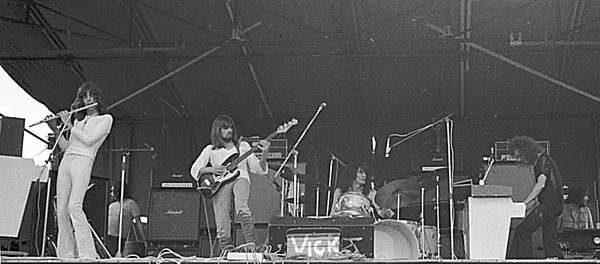





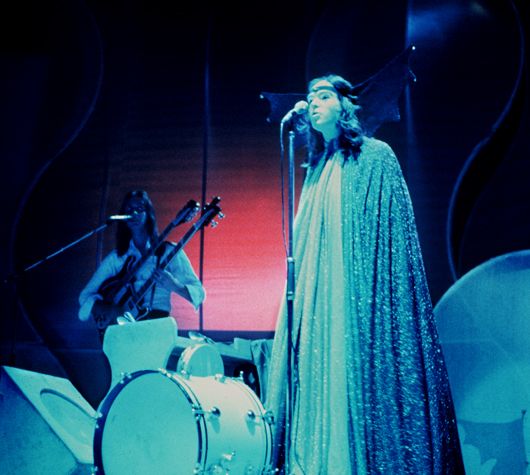
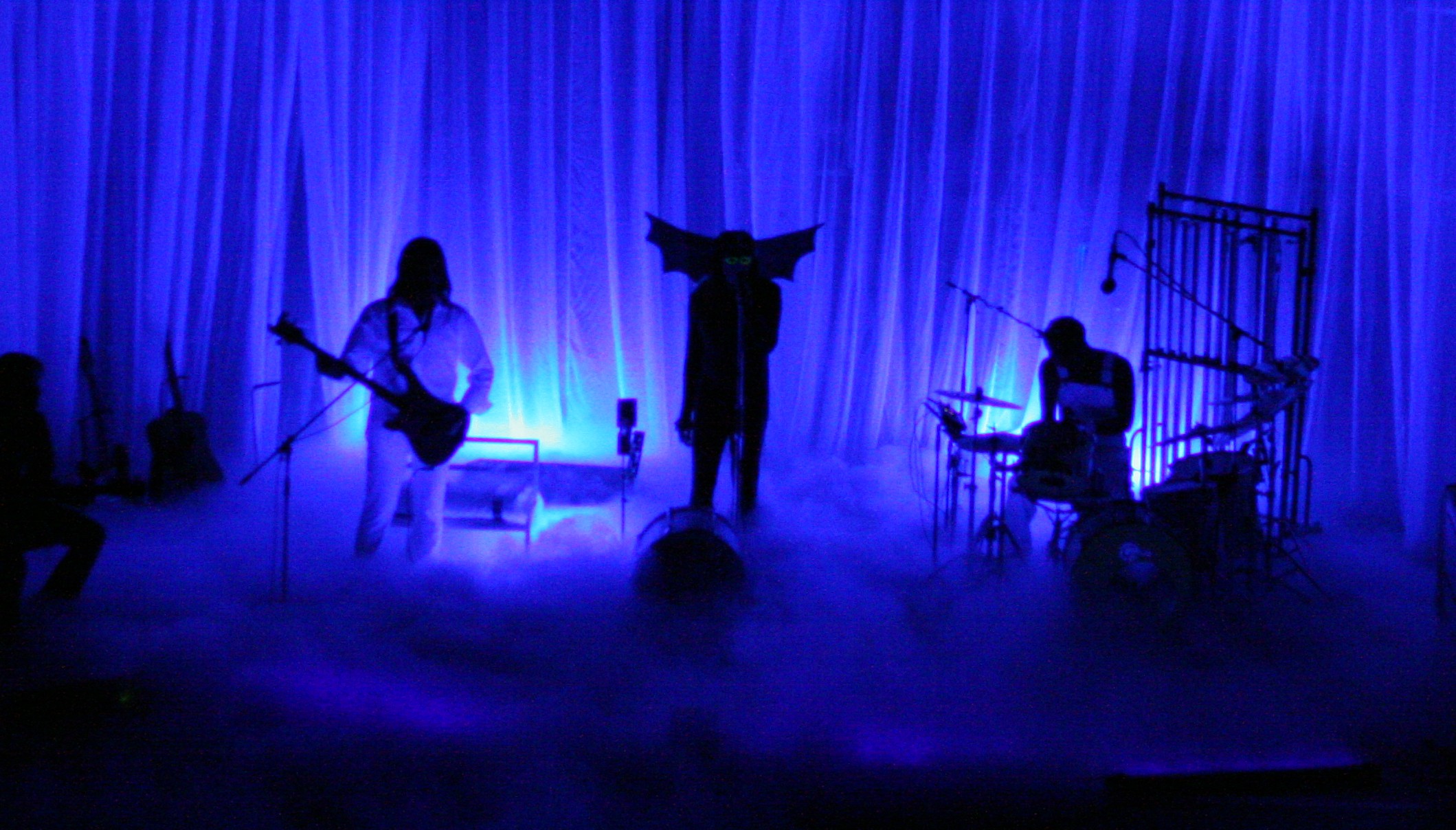



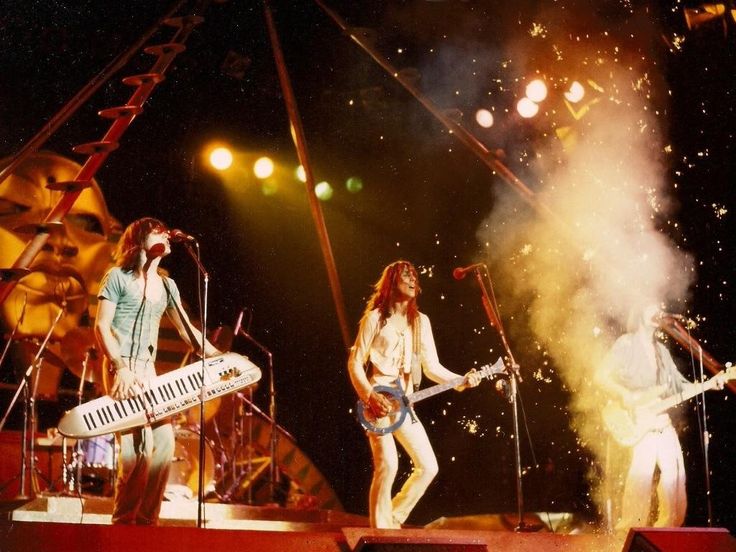
to be continued..
Offline
#11 2019-01-15 10:19:41
- Svetonio
- Member

- Registered: 2012-03-11
- Posts: 7525
Re: What's Prog?
So what happened with our beloved genre in the Eighties? As I mentioned already in my previous post, at the end of the Seventies, due to punk-rock and new wave hysteria, the music press became the enemy of Prog in general, what clearly reflected on the music industry and hence Prog became much less represented in the records production than in previous decade. However, in the spite of that, in the early Eighties, three beautiful things happened; in particular in Continental European countries like France, Belgium, Italy and the former Yugoslavia, there has been a certain degree of young audience's enthusiasm for digging the albums of Experimental rock acts like Frank Zappa, Can, Henry Cow, Art Bears, Magma, Univers Zero, Stormy Six, Etron Fou Leloublan and so on; also, the then youth were receptive to listen to Brian Eno's ambient music as well as ECM jazz.
Univers Zero & Art Zoyd live at the Jazz Pulsation Festival, France, 1980
Begnagrad live in Kopar, Slovenia, former Yugoslavia 1982
Frank Zappa Moggio (from The Man From Utopia, 1983)
Mr Fripp re-formed King Crimson which released three rather good albums that were inspired by the sound of New Wave; the first that being titled Discipline (1981) is an excellent album that showed that Progressive rock didn't completely die during the punk/new wave hysteria.
King Crimson Thela Hun Ginjeet, (from Discipline, 1981)
Also a beautiful thing that happened in the first half of the '80s was 'British Symphonic Rock Revival', today much more famous as 'Neo-Prog' movement, which started with Marilliion; this band were succeeding with their debut album Script for a Jester's Tear released in March 1983. Script for a Jester's Tear the album is an ingeniously achievement of Symphonic rock from the Eighties and, along with already mentioned King Crimson's Progressive rock trilogy, it's a "must-have" LP in a collection of every "prog-head".
Marillion live at Hammersmith Odeon, London 1983
to be continued..
Offline
#12 2019-01-18 11:35:32
- Svetonio
- Member

- Registered: 2012-03-11
- Posts: 7525
Re: What's Prog?
Whether some prog-head in the late 1980s - i.e. at the time when our beloved genre went to clinical death - might have got a precognition that Prog in the early '90s would experience an instant recovery due to a creepy wedding with Heavy Metal? I didn't hear yet about such a prophet, but in the early nineties Dream Theater saved Prog actually; Dream Theater gave to the genre a new blood with their creation of a new genre of Progressive music that is amazing DT-school of tasteful Progressive metal which could be defined as metalized Symphonic rock a la Yes.
Although previously there had been some exciting, but sporadic attempts to merge Metal and the Prog Rock idiom - maybe the best example of those attempts is Stargazer the song from Rainbow's 1976 album Rainbow Rising - nobody did it so fundamentally before Dream Theater. It was 1992 and Images and Words; that masterpiece album raged from the speakers and pushed thousands of kids around the globe to move from Heavy Metal to Progressive metal that is so heavy in riffs, nothing less heavy than any band of NWOBHM, and yet Prog. Thanks to Dream Theater, our beloved genre is resurrected in all of its glory.
Dream Theater Pull Me Under (from Images And Words, 1992)
Dream Theater Scene Seven: I. The Dance of Eternity (from Metropolis Pt. 2: Scenes from a Memory, 1999)
Dream Theater Solitary Shell (from Six Degrees of Inner Turbulence, 2002)
to be continued..
Offline
#13 2019-01-19 10:50:50
- Svetonio
- Member

- Registered: 2012-03-11
- Posts: 7525
Re: What's Prog?
Someone said pretty wisely that the creativity of the independent artists has never been better than now; due to modern technology, there are lots of magnificent albums that are being released in the new millennium as self-releases on the Internet platforms. Prog bands no longer largely depend on the goodwill and taste of the record companies. So today, our beloved genre is coming to us from almost all directions that popular music has given to the world so far. It comes from alt.rock, indie-rock, world music, post-rock, et cetera, and flows into Prog. And yet, the classic genres of Progressive music that were established in the late Sixties - Progressive rock, Symphonic rock and Jazz-Rock - are not neglected at the present day; on the contrary, there are a number of contemporary bands that are creating their original music within these classic genres' frames as well.
Well, some people will always try to neglect most of the new stuff and to minimize the quality of contemporary Prog in general, but my advice to a newbie that is into modern Prog would be - just don't give a shit on them, because there is not any valid argument against the magnificent contemporary Prog achievements that are here to stay.
Napier's Bones Psychic Driving (progressive rock) (from Alpha-Omega Man, 2017)
Sunchild Victory Voyager (symphonic rock) from Messages from Afar: the Division and Illusion of Time, 2018)
Bosque Four Noble Truths (jazz-rock) (from Four Noble Truths, 2015)
Offline
#14 2019-08-24 08:06:57
- Svetonio
- Member

- Registered: 2012-03-11
- Posts: 7525
Re: What's Prog?
Since a supposed newbie is gonna be often faced with *Art Rock* tag, I'd like to clarify what that term means, 'cause Art Rock is not just an American term for everything that's more complex than a three chord rock n roll song. Actually, Art Rock is a term coined for a distinctive genre originated in England in the late '60s that could be defined as a pop-rock with a huge artistic approach. The legacy of English Art Rock is tremendous, versatile and exciting; those acts like 10cc, Supertramp, Barclay James Harvest, Roxy Music, Be Bop Deluxe, Sad Café, Kate Bush, Phil Manzanera, Peter Gabriel (first three solo albums), early Elton John and David Bowie were all great. Although Art Rock belonged to the then mainstream, due to its often "proggy" sounds, this genre was (is) very appreciated among progheads as well.
Art Rock was (is) mostly an English thing, though it can be detected in continental Europe as well as in the U.S.
Roxy Music The Bogus Man (from For Your Pleasure, 1973)
Barcley James Harvest Moongirl (from Time Honoured Ghosts, 1975)
10cc Une Nuit a Paris (Part 1) / The Same Night In Paris (Part 2) / Later The Same Night In Paris... (from The Original Soundtrack, 1975)
Supertramp Lady (from Crisis? What Crisis?, 1975)
Be-Bop Deluxe Sleep That Burns (from Sunburst Finish, 1976)
Offline
#15 2019-12-03 05:11:59
- Svetonio
- Member

- Registered: 2012-03-11
- Posts: 7525
Re: What's Prog?
The terms "progressive folk-rock" and (or) "prog-folk" didn't exist back in the day; only "folk-rock" it was. However, as a hindsight, we could say that some of the late 60's / 70's folk-rock efforts really belonged to the Progressive music zeitgeist.
Spirogyra The Duke of Beaufoot (from St. Radigunds, 1971)
Strawbs The Shepherd's Song (from From the Witchwood, 1971)
Jethro Tull Velvet Green (from Songs from the Wood, 1977)
Offline





